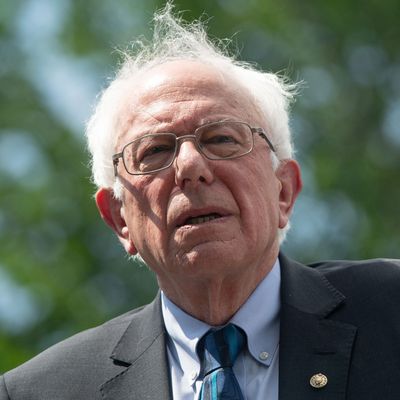
NBC’s Kasie Hunt asked Bernie Sanders if he would commit to supporting the Democratic nominee before the convention if it’s clear it won’t be him. Sanders would not make any such commitment. Instead, he said, “some people say that maybe if the system was not rigged against me, I would have won the nomination.”
While Sanders is coyly hiding behind the “some people say” formulation, he is threatening to repeat the tactics he used in 2016, when he called the process “rigged” and withheld his support long after the outcome was decided.
In 2016, Hillary Clinton won the nomination as the clear preference of the majority of her party’s electorate. She won 55 percent of the primary vote, as opposed to just 43 percent for Sanders, which is not an especially narrow margin.
It is true that, in a very broad sense, Democratic Party leaders decided early on to support Clinton’s candidacy, and she received major endorsements from elected officials and interest groups. That, however, is not what most people understand by the term “rigged.” What’s more, the process probably benefited Sanders. By clearing the field for Clinton, Sanders was able to position himself as the catch-all candidate for a broad coalition of voters who opposed Clinton for various reasons: Voters who considered her too moderate, or too liberal, or too corrupt all voted for Sanders, who had the anti-Clinton field to himself.
It is not true that the Democratic Party “rigged” the contest in any illegitimate or nefarious fashion. Russian hackers found some emails from staffers at the Democratic National Committee favoring Clinton, but the committee did not take important steps to materially impair Sanders. Throughout the primary, some real (or putative) supporters of Sanders often claimed improprieties at the polls, but those largely failed to pan out. Sanders supporters also reacted to the prospect that Democratic Party superdelegates would give Clinton the nomination even in the face of a popular-vote defeat, but that scenario turned out to be moot in the face of Clinton’s clear win.
Notably, Robert Mueller’s investigation found that Russian social-media bots amplified Sanders’s message during the primary and circulated attacks on Clinton, many of them false. Sanders himself bore no responsibility for that social-media operation, but it is arguably a form of “rigging” — by Russia — more underhanded than any action taken on Clinton’s behalf.
Sanders withheld his endorsement of Clinton until the middle of July, and his delegates to the convention devoted much of their energy to vigorously protesting the proceedings. The booing from the audience was so loud that speakers either struggled through their remarks or stopped to plead with the delegates.
Sanders clearly resents being asked hypothetical questions that force him to entertain the prospect he might lose. But he faces these questions for the same reason Donald Trump was frequently asked if he would accept an unfavorable outcome: because he has a record of challenging the legitimacy of the outcome when he loses. Only Sanders gets asked this question because only Sanders has ever claimed to have been the victim of Democratic Party rigging, and only Sanders selected a slate of delegates who tried to disrupt their party’s convention.
If his answer to Hunt is any indication, he might do it again in 2020.






























